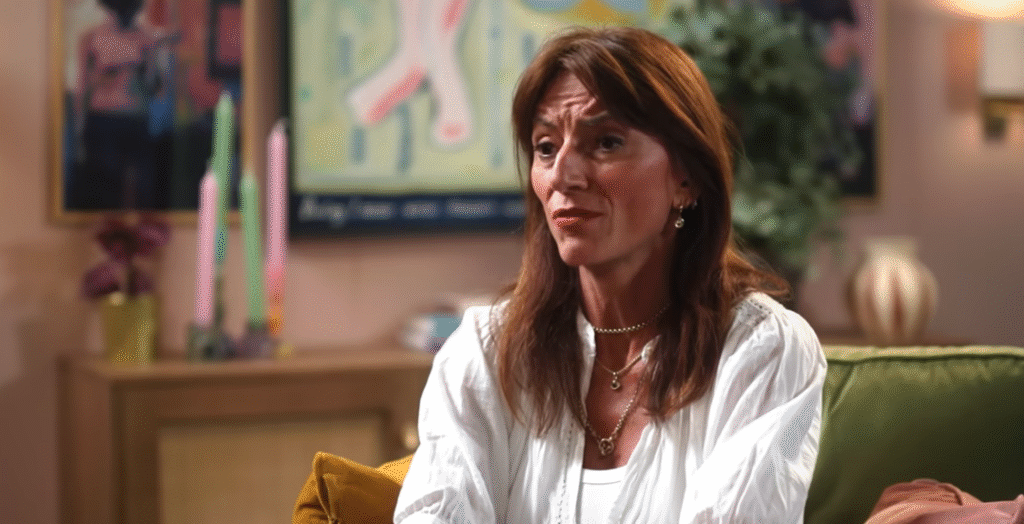Davina McCall Personal and Career Profile
| Attribute | Information |
|---|---|
| Full Name | Davina Lucy Pascale McCall |
| Date of Birth | October 16, 1967 |
| Age | 57 (as of 2025) |
| Nationality | British |
| Profession | Television presenter, author, wellness advocate |
| Notable Shows | Big Brother, The Masked Singer, My Mum, Your Dad |
| Health Incident | Underwent brain surgery in November 2024 to remove a colloid cyst |
| Surgeon | Kevin O’Neill, neurosurgeon recommended by actress Caprice Bourret |
| Recognition | MBE (2023), National Television Special Recognition Award (2024) |
| Reference Source | https://www.bbc.com/news/articles/ce9npz05mv7o |

Long known for her boundless energy and piercing charisma, Davina McCall faced a devastating moment in late 2024 when a colloid cyst—a rare, benign brain tumor—was discovered during a health scan. Despite being classified as benign, the diagnosis hit her hard, upsetting her emotional balance and self-assurance. According to her, the cyst had “taken control” of her life and deprived her of the sense of security she had always had in her body.
The cyst was unexpectedly found during a routine health examination related to her menopause advocacy. She found an invisible danger within her own brain while advocating for women’s health, which was a profoundly personal irony. The tumor’s location in a sensitive area of the brain, where even benign growths can cause abrupt and deadly pressure on critical structures, is noteworthy. There was actual urgency. She had been walking with a hidden time bomb, with no outward signs of symptoms.
Actress Caprice Bourret suggested neurosurgeon Kevin O’Neill, and McCall made the choice that would drastically alter her future. The November 2024 procedure was regarded as both technically challenging and extremely efficient. She spent a short but intense time in the intensive care unit after surgery. Her Instagram post of herself smiling subtly under hospital sheets while in the recovery bed resonated. The host, who had always seemed invincible, was now subtly vulnerable—and incredibly courageous.
Because she didn’t know anyone with that name, she gave the cyst the name Jeffrey. She even threw Jeffrey a birthday party prior to surgery, which was a very human gesture and a peculiar way for her to cope with the impending danger. She acknowledged on her Begin Again podcast that naming it enabled her to face the fear without giving in to it. Her experience struck a particularly deep chord with audiences of all ages because of her ability to publicly share her fear and humor.
In addition to healing, the days after surgery were spent reassessing everything. McCall made sure her family had a plan in place in case she didn’t live by securing her will and setting up a WhatsApp group for them. Although emotionally taxing, these preparations demonstrated the extent to which she had internalized the seriousness of her circumstances. She once asked her partner, renowned hairdresser Michael Douglas, to respect her children and wrote them heartfelt letters of well wishes. Her audience found it unquestionably real because of her emotional readiness.
A nationwide discussion about benign tumors and their frequently misinterpreted risks was spurred by McCall’s story. She vehemently disputed the widespread belief that “benign” equates to harmless. In a poignant episode of her podcast, she informed listeners that “benign doesn’t mean fine.” A knowledge gap that impacts thousands of people was brought to light by that statement, which was remarkably straightforward and brutally honest. According to the NHS, benign tumors can still harm surrounding tissue or result in serious health issues even though they don’t spread.
She gradually but consciously returned to public life over the ensuing months. Compassion and a startling update greeted her return: her last MRI showed the tumor had been totally removed. She told her fans, clearly relieved and emotionally stable, “It’s not coming back.” For fans who had followed her journey closely and found strength in it, as well as for her own peace of mind, this news was especially helpful.
Since then, her advocacy strategy has changed. She now speaks at the nexus of wider health activism rather than just menopause awareness. Numerous people have been inspired to take health examinations seriously by her story, which has been shared without any filters. In a way that is rarely accomplished by planned awareness campaigns, her vulnerability has increased trust.
Her situation is consistent with a growing trend in which public figures openly discuss private health concerns. Similar to Michael J. Fox’s continuous fight with Parkinson’s disease or Selma Blair’s openness about multiple sclerosis, McCall’s choice to express her rage and anxieties added nuance to a frequently sanitized discourse about wellbeing. These well-known individuals are educators who use their suffering to bring attention to overlooked realities; they are not merely survivors.
The majority of societal responses to McCall’s recuperation were positive. People liked how she struck a balance between optimism and reality. She stayed grounded instead of portraying herself as a victim or a superhero. She just handled her fear and anxiety with grace, without downplaying or ignoring them. She imparted an important lesson with this: it’s acceptable to be afraid and still show up.
McCall thinks she will eventually consider the experience to be one of her life’s greatest blessings. It gave her access to aspects of herself that she had never known existed. It made her realize how quickly things can change and how extremely valuable even a typical day can be. She urged viewers to “write your bucket list now” during a recent TV appearance; it sounded more like a lifeline than advice.
She returned to television looking more beautiful than ever after going through such a traumatic experience; her unexpected appearance on The Masked Singer wearing a platinum blonde wig was a cheeky nod to reinvention. However, it was also a declaration that she is not finished and is still here.
She still maintains a very close friendship with her surgeon. She refers to him as “a friend for life,” a designation he has earned not only by saving her but also by providing comfort in her most vulnerable moments. Their relationship is proof of the transformative closeness of medical trust.
FAQs
Why did Davina McCall undergo brain surgery?
A routine scan revealed a colloid cyst, a rare but potentially fatal benign brain tumour.
Was the cyst life-threatening?
Yes, due to its position in the brain, it could have caused sudden neurological failure.
Who performed the surgery?
Neurosurgeon Kevin O’Neill, recommended by Caprice Bourret.
Did she have symptoms beforehand?
Not prominently, but the cyst was found as part of a proactive health check.
How did she prepare emotionally?
She rewrote her will, spoke to her partner, and wrote personal letters to her children.
What was the result of the surgery?
The tumour was fully removed, and doctors confirmed it will not return.
Did the experience change her outlook?
Yes, it deepened her appreciation for life and strengthened her commitment to health advocacy.
What message did she share publicly?
“Benign doesn’t mean fine”—raising awareness about the hidden risks of such tumours.
Is she back on television now?
Yes, she resumed public appearances and returned to her hosting duties.
How has society responded?
The response has been notably supportive, with many praising her openness and resilience.
